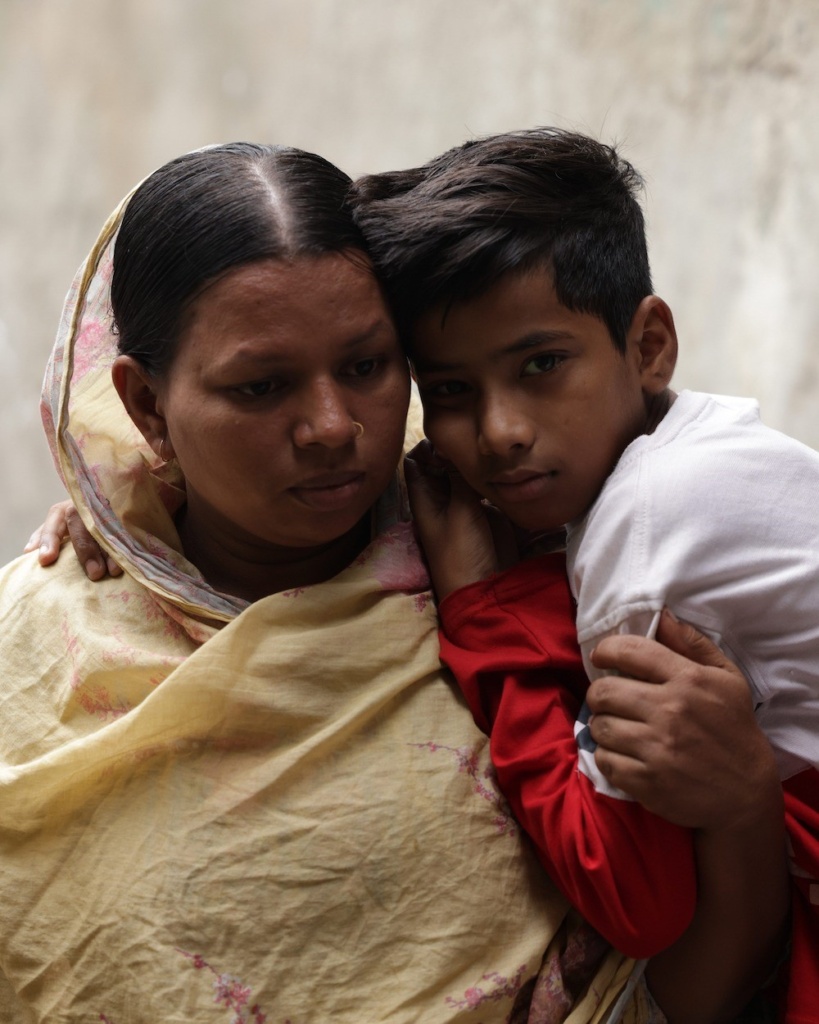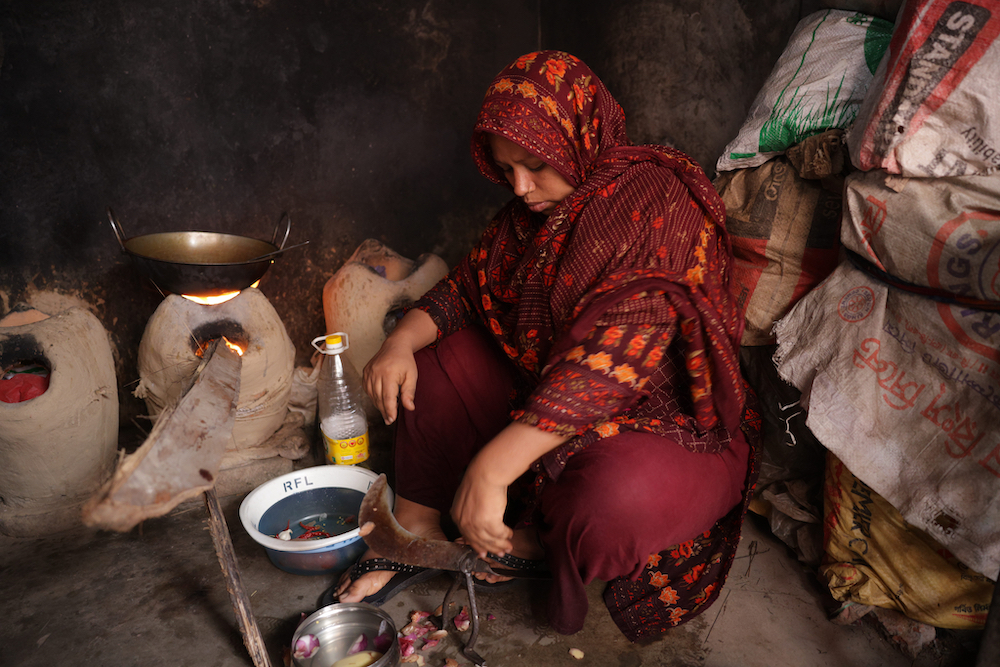Meet Sumi: Building Strength and Resilience in Duaripara
Duaripara, home to over 1,500 families, is a vibrant community in Dhaka, Bangladesh, facing a range of challenges like overcrowding, insufficient water and sanitation services, and the ever-present threat of climate change. Many of its residents, who work in garment factories, domestic roles, or operate small businesses, continue to demonstrate resilience in the face of adversity, united by a shared vision of improving their lives and community.
As Dhaka continues to grow by an average of 2,000 new arrivals each day, driven by the increasing impacts of climate-related disasters like rising sea levels and tropical storms, informal settlements like Duaripara become vital spaces of opportunity and challenge. According to the 2022 census by the Bangladesh Bureau of Statistics, 1.82 million people live in slum conditions across the country. In these communities, the majority of housing is temporary, and access to clean water and sanitation remains limited. In Duaripara, access to a secure, dignified life is about more than just a place to sleep; it’s about building a foundation for a better future.
Community-led Solutions
Sumi, a lifelong resident of Duaripara, embodies this spirit of self-reliance. Trained in skills like masonry, carpentry, and first aid, she is an active member of the Community Water, Sanitation, and Hygiene Committee (CWC), a group of residents working in partnership with organizations like Habitat for Humanity. Sumi’s commitment to her neighbors goes beyond day-to-day survival—she’s helping to create lasting change.
In March 2023, when a fire broke out in the community, Sumi and her fellow CWC members responded quickly, organizing evacuations and gathering essentials like food and clothing. With support from Habitat, they also distributed kitchen utensils to families affected by the disaster. Sumi says, “From a young age, I was brought up to help others in need. It’s a matter of conscience.” Her belief in the power of community action is clear: “If more people in Duaripara received safety training, we could prevent so much damage.”

Leading by Example
Each month, Sumi leads training sessions to improve hygiene practices and organizes clean-up campaigns, all while monitoring the condition of water and sanitation facilities. She has played a key role in fostering community participation, lending her efforts to Habitat’s Home Equals Campaign to advance policy changes that benefit informal settlements like Duaripara.
After completing her household chores each day, Sumi and other CWC members walk through the community, offering help wherever it’s needed. Whether she’s clearing drainage systems of debris, mediating conflicts, or guiding parents through challenges with their teenagers, Sumi finds joy in her role. “I like that people come to me with their problems. If I can help, I feel happy, not just for them, but for all of us,” she says.
Challenges at Home
While Sumi is dedicated to improving her community, she also faces her own struggles, particularly when it comes to accessing basic services for her family. Water scarcity is a constant issue. “I have a water supply problem in my house. When the water runs out, the electricity bills rise. We only get water once a week,” she shares. To ensure her family has safe drinking water, Sumi spends 500 taka (around US$5) a month on refills, as the cost of connecting to a government water line is far beyond her reach. The lack of gas for cooking is another ongoing challenge. “Sometimes, there’s no gas. I wake up at 4 a.m. to cook for the entire day. It’s hard, but when I sit down to share a meal with my son and daughter, I feel at peace.”
A Hopeful Future
Despite the difficulties, Sumi is grateful for the strength and support of her neighbors in Duaripara. “People here are active. They love each other, and we stay together through the hard times.” The sense of fellowship in Duaripara is what drives the community forward, turning everyday challenges into opportunities for collective action and growth.
Habitat for Humanity, through the “Building Resilient Urban Slum Settlements” project in Dhaka, supported by the Australian Government through the Australian NGO Cooperation Program (ANCP), is working in partnership with communities like Duaripara to create lasting change. Together, we are building the strength, stability, and self-reliance needed for a brighter future.

Sumi also conducts monthly training sessions for 15 – 20 people to improve hygiene standards, organises community cleaning once a month, and monitors the state of water and sanitation facilities in her community, along with other CWC members. She has been instrumental in leading community participation and innovative solutions, supporting Habitat’s Home Equals Campaign as we seek to scale up policy and systems change.
Each day, after Sumi is done with household chores, she and other CWC members walk around the community to see how they can help others. Often, Sumi will pick up garbage that clogs the drainage system. She also mediates marital conflicts and advises parents about adolescents’ behavioural changes. “I like that people come to me with their problems. If I can solve the problem, I feel happy for the community and myself.”
Whilst Sumi occupies her time helping others in her community she also faces her own issues when it comes to secure housing and supporting her family. These challenges include accessing clean water. “I have a water supply problem in my house. When there is no water, the electricity bill suddenly rises so I get water once a week. I am suffering from it, and I feel sad.” She buys filtered water for her family, refilling four times a month and paying a total of 500 taka (almost US$5). This is a more affordable option compared to the 20,000-taka fee for connection to a government water line and paying by the meter according to the amount used. She also grapples with the lack of gas supply. “Sometimes, there is no gas to cook. I have to wake up at 4 a.m. to cook meals for the whole day. The following night, I (have to) cook again; it’s a big pain.” Despite this Sumi says that sharing a meal with her son, Jim (age 10) and her daughter Chadni (age 17) is one of her favorite times, “The heart of my home is my son and daughter. When they return home, we have lunch together…I feel good and peaceful,”
Despite the challenges, Sumi values the diverse and active community in Duaripara. “People in our community are active. They have love and fellowship. They stay together and share each other’s suffering.”
Habitat for Humanity, through the “Building Resilient Urban Slum Settlements” project in Dhaka, receives support from the Australian Government through the Australian NGO Cooperation Program (ANCP), and is working in partnership with Habitat for Humanity Bangladesh in communities like Duaripara to create lasting change. Together, we are building the strength, stability, and self-reliance needed for a brighter future.

Read more of our impact stories here.



